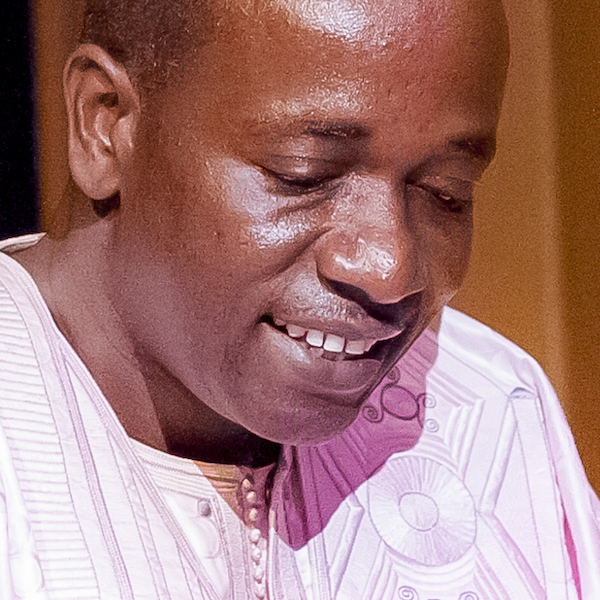Balla Kouyaté

Brendan Mercure Photography
Bio
Balla Kouyaté’s lineage goes back more than 800 years to Balla Faséké, the first of an unbroken line of djelis in the Kouyaté clan. The word “djeli” derives from the Mandinka language, meaning the oral historians, musicians, and performers who keep alive and celebrate the history of the Mandé people of Mali, Guinea, and other West African countries. Kouyaté explains, “It means blood and speaks to the central role we play in our society.” Kouyaté’s dedication to carrying on his family’s hereditary role as a djeli, his musical virtuosity on the balafon (the West African antecedent of the xylophone), and his humble nature and humility set him apart from others.
Oral tradition holds that when the emperor Sundiata overthrew Soumaora Kante, he appointed the Kouyaté family to protect the balafon. Today, Balla Kouyaté is a virtuoso player of this instrument. Played with mallets, the balafon is made up of wooden slats and rows of calabash gourds, which serve as natural amplifiers. The original musical instrument, known as the “Sosso-Bala,” survives in Kouyaté’s father’s home village of Niagassola, on the Mali-Guinea border. In 2001, the Sosso-Bala was declared a item of intangible cultural heritage by UNESCO and is brought out once a year for ceremonial playing.
The Kouyaté family is regarded as the original praise-singers of the Malinké people, one of the ethnic groups found across much of West Africa. Balla Kouyaté learned to play the balafon as a child and was soon playing alongside his mother, motivating agricultural laborers during harvest season. As a young adult, he emigrated to the U.S. in 2000 to pursue music as a profession, settling in Massachusetts in 2001.
Today, he is ever present performing at weddings, baptisms, naming ceremonies, and other domestic ceremonies within the West African immigrant communities of Boston, New York City, and beyond. He is equally motivated to share his music with the larger world through his work as a soloist, arranger, and bandleader. Often billed as fusion, his music explores jazz and other outside influences, while remaining consciously rooted in the Mandé tradition.
Kouyaté is featured on more than 25 albums, including Yo-Yo Ma’s Songs of Joy and Peace and Sing Me Home. He also regularly plays with world-renowned West African musicians touring the States. In 2004, Kouyaté joined NEA National Heritage Fellow Sidiki Conde for a month-long residency at Carnegie Hall. Recent awards include a 2010 Mass Cultural Council Fellowship in the Traditional Arts, a 2014 Mass Cultural Council Traditional Arts Apprenticeship awarded to Kouyaté and his son Sekou, and a 2015 Brother Thomas Fellowship awarded by the Boston Foundation. He is a frequent visiting lecturer/performer at colleges and museums throughout the United States. He is on the faculty at the New England Conservatory.
Bio by Maggie Holtzberg, Mass Cultural Council

